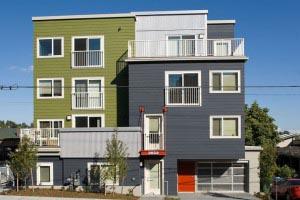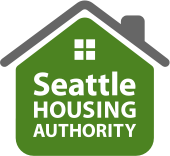
Households in the Project-based and Mod Rehab programs pay 30 percent of their monthly income for rent and utilities. Housing assistance covers the remaining cost of rent and utilities.
This type of housing assistance works differently from Seattle Housing Authority's (SHA) tenant-based voucher program, in which households are issued vouchers they use in the private rental market. In the Project-based and Mod Rehab programs, households apply directly to the nonprofit agencies and the vouchers cannot transfer from the specific units they are assigned to.
Property managers advertise vacant units and have their own screening criteria. Contact agencies directly to learn about each program's eligibility requirements, available units and how to apply.
Households pay 30 percent of monthly adjusted income for rent and utilities in the Project-based and Mod Rehab programs. Monthly adjusted income is a household's income, after certain deductions and allowances are taken into account. Households continue to pay reduced rent as long as they live in a Project-based or Mod Rehab unit.
SHA conducts reviews either every year or every three years, depending on who is in the household, to make sure the household is still eligible for the program. The agency providing the housing checks the household's income and family composition.
SHA also inspects Project-based and Mod Rehab units at least every two years to ensure compliance with Housing Quality Standards. The unit must pass the inspection for assistance to continue.
Participants may move from one Project-based or Mod Rehab building to another and continue to receive assistance, but will have to submit a new application for the new building. Eligibility requirements may vary among buildings. Participants who move into a building or unit that is not covered by the program will lose housing assistance.
SHA may terminate assistance when a household's income increases to the point the household is no longer eligible, or because it has not fulfilled the program's obligations.
Project-based and Mod Rehab tenants and landlords each have rights, and are subject to requirements, while participating in the program. SHA performs specific duties as the administrator of the program.
Tenant rights
As a tenant, state law grants you the right to a livable dwelling, protection from unlawful discrimination, the right to hold the landlord liable for damage caused by the landlord's negligence, and protection against lockouts and seizure of personal property by the landlord.
Tenant responsibilities
- Supply required information—You must submit all information for regular re-examinations of income, household composition, immigration status, and to verify that you live in the unit
- Report changes in income or household members within 10 business days—You must update Seattle Housing Authority if family income, household composition, or immigration status changes in any way, or if the household is being evicted. You must also notify the agency after a birth, adoption or legal-custodial arrangement, or if a family member moves out of the unit
- Allow Seattle Housing Authority to inspect the unit—You must allow Seattle Housing Authority to inspect the unit to ensure that it complies with HUD's Housing Quality Standards. You must also allow the agency to inspect the unit as requested by the landlord
- Live in the subsidized unit only—You must use the subsidized unit as your primary residence. You cannot lease or sub-lease the unit
- Pay bills as required by the lease—You must pay your portion of the rent and utilities each month, as described in the lease
- Comply with the terms of the lease and the Tenancy Addendum—You should read the terms of the lease and Tenancy Addendum carefully. If you have questions about any of these documents, contact the Housing Choice Voucher Program at 206-239-1728
- Do not commit any prohibited, unlawful or criminal act—You must not commit any prohibited or unlawful act in connection with the program, such as fraud, bribery or making side payments to landlords. You also must not participate in illegal drug activity or violent criminal activity of any kind
- Abide by the obligations of Washington State Landlord–Tenant law—Under state law, voucher-assisted tenants have the same responsibilities as unassisted tenants
Landlord rights
Landlords have the right to hold tenants responsible for tenant-caused damage to a unit, not including normal wear-and-tear. Tenants may be required to pay for or repair damage they have caused.
Landlords have the right, and the obligation, to select tenants using the same standards they apply to all applicants for their rental units. They may deny applicants who do not meet their screening criteria.
Landlord responsibilities
- Screen all applicants for suitability—Landlords may ask Seattle Housing Authority to supply the name, address, and telephone number of the last landlord to rent to the tenant
- Allow Seattle Housing Authority to inspect the unit—Landlords must allow Seattle Housing Authority to inspect the unit to ensure that it complies with HUD's Housing Quality Standards. Landlords must also allow the agency to inspect the unit at its request, or as requested by the tenant
- Make timely repairs to keep the property in good condition—Landlords are required to keep the unit in good condition and ensure that it complies with Housing Quality Standards. They must make all necessary repairs in a reasonable time period, or, if damage is caused by the tenant, notify the tenant that it is his or her responsibility to pay for or repair the damage
- Collect the tenant's portion of the rent—Seattle Housing Authority will not collect rent
- Abide by the lease (with the tenant) and the HAP Contract (with Seattle Housing Authority)—Owners must comply with the terms of the lease signed with the tenant and the Housing Assistance Payment (HAP) Contract signed with Seattle Housing Authority
- Comply with federal fair housing laws—For questions about the requirements of federal fair housing laws, contact the Housing Choice Voucher Program at 206-239-1728
- Abide by the obligations of Washington State Landlord–Tenant law—Under state law, landlords have the same responsibilities to voucher-assisted tenants as they do to unassisted tenants
Seattle Housing Authority's role
As the local administrator of the Project-based and Mod Rehab programs, Seattle Housing Authority:
- Determines whether tenants are eligible for the program
- Pays the program's portion of the rent and utilities to the landlord in a timely manner
- Inspects units to ensure that they are sanitary, safe, and decent
- Re-certifies tenants' income once a year
- Re-inspects units at least once a year to make sure they still meet Housing Quality Standards
- Monitors tenants and owners to ensure compliance with program rules
- Manages daily operations with fiscal integrity and in accordance with federal rules and regulations
Seattle Housing Authority's role in the program is limited, and there are some things the agency does not do. In general, Seattle Housing Authority does not:
- Screen tenants for suitability
- Collect tenants' portion of rent
- Enforce lease terms
- Evict tenants who do not comply with the lease
- Resolve disputes between owners and tenants
- Share the tenant's personal information with the owner without written releases of information from the tenant
